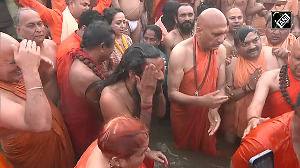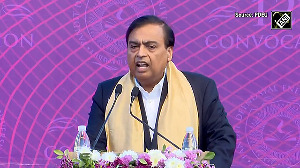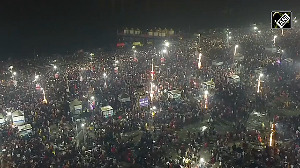As I tried to correct him, I realised his description of the Oscars would please his grandfather, my dad, T P Sreenivasan. If he'd heard Krishna, he might have said, "Yes, that's about right." After all, that's basically what my father thinks of the worthiness of Slumdog Millionaire. He captured his feelings about the movie in a piece in Rediff entitled Exploiting India. Among the, er, highlights:
- Having read the novel and seen the film, I cannot say that it has done more good than harm to India. This is not a matter of my wanting to shove the reality under the carpet.
- ...the film is exploitation of the novel, of Dharavi, of poverty, of Rahman, of India itself to titillate foreign audiences. It is the exploitation of the new curiosity about India's success. The curiosity today is not about maharajas and snake charmers, magic or rope trick, but about the market and the malls, the computers and the cell phones.
- India rejoiced at the Gandhi Oscars, but Slumdog Oscars, if any, will only highlight how India became a victim of exploitation.
- Quoting someone else: "It is poverty porn at its worst. The Mumbai marauders are supposed to have done their deed to hurt India, to challenge its success, to expose its soft underbelly. But this movie has done the job better."
Like all good opinion pieces, it's provocative and makes its points without subtlety. In keeping with what seems now to be family tradition, my younger brother and I are mentioned -- and promptly dismissed -- as 'champions of the film.'
He and I can agree 100 per cent on a para he wrote toward the end:
The fact remains, however, that the novelist and the makers of the movie have brought to light the horrors of Dharavi. If the passion it has aroused could be directed towards a mass movement to combat the evils of the slum and to eliminate the slums altogether in stages, that would be an appropriate response to the movie.
The fact is, India is too great a country to have its reputation made or broken by a single movie and Indians everywhere should have thicker skins. Heck, I was ready to protest within the first few minutes of the movie, too. After all, the main torturer in the film is a constable named Srinivas!
I also wanted share a piece I wrote at Oscar time in 2000 (slightly different versions ran in Rediff and in Beliefnet, the US religion site). It opened thus:
"GAN-DEE, Gan-dee, Gan-dee," they chanted. "Cow lover," "cow ****er," "Hin-doo schmuck."
The words spewed from the lips of eight boys in Catholic school uniforms gathered outside their junior high school in New York City. The object of their spite was a fellow seventh grader, a brown kid with metal braces on his teeth and a clip-on tie on his neck. He was the only Indian boy in a school filled with whites, blacks, Hispanics, and a few Asians. There was one Indian-looking girl in the sixth-grade, but he'd seen her only from afar.
The chanting continued as the boys circled the Indian kid, yelling, laughing, and taunting him. One of the bigger boys reached out and shoved him. Someone caught the Indian and pushed him back. He looked nervous, his face bordering on fright. The taunting continued. "Hin-doo Gan-dee."
A teacher happened to wander by and ordered the boys to "break it up." And just like that, it was over.
That was 17 years ago, and I was the Indian boy.
I had gotten their attention because the previous night, at the Oscars, two movies that my schoolmates were cheering for -- E.T. the Extra-Terrestrial and Tootsie -- were almost shut out. You see, that evening in 1983, Gandhi won eight Academy Awards and made a few ignorant young Americans unhappy. Their little brown alien had been silenced by a little brown man.
For a couple of minutes that distant day, my Indianness was not my strongest asset.
I went on to describe making my peace with Oscar. Two years in a row, South Asians had been featured prominently at the Oscars. In 1999, it was Shekhar Kapur's Elizabeth and in 2000, it was M Night Shyamalan and the six nominations for The Sixth Sense, as well as Deepak Nayar, co-producer of Buena Vista Social Club, a nominee for best documentary, plus, Caravan, a French-Nepalese production in the category for best foreign film and Nepal's first nomination for an Oscar.
I had been allowed to watch the Oscar telecast in 1983 and still remember being excited to see light-blue-sari-clad Bhanu Athaiya collect the Best Costume award, even though I had no idea who she was (and, by the way, I am not even sure that was the colour!).
In the NYC of the early 1980s, seeing anything Indian hit the mainstream was impossible. Unlike today, when it's routine for my kids to see South Asian faces pop-up all over the TV, from Vijay Singh at golf tournaments, to M.I.A. at the Grammys, to Kal Penn at the Obama inaugural concert (and House), to Apu on The Simpsons, to Padma Lakshmi on Top Chef, to my friend Ajay Mehta, who plays the grocery store manager in those ubiquitous Fiber One ads ("Cardboard, no. Delicious, yes."). And that's not counting all the desi faces doing newsy stuff, Sanjay Gupta, Ali Velshi, Zain Verjee, Martin Bashir, Uma Pemmaraju, Kevin Negandhi, Fareed Zakaria etc, etc, etc, etc and even Aasif Mandvi, fake reporter on The Daily Show.
When I was growing up here, the only desi journalist on television: a family friend reading the news from India on an almost-homemade one-hour Indian television show. No desi authors on book tours, no celebrity desi chefs or directors, no desi governors and no desi CEOs of Fortune 500 corporations. Just this week, my kids took in stride the elimination of Anoop Desai, who'd made it to the top 36 on American Idol. There were certainly no desis on the equivalent of American Idol back then -- that would be That's Incredible, I guess (Star Search didn't even debut, desi-free, till I had left the US).
So just why am I, like my father accuses me of being, a champion of Slumdog? Its cinematography, its storytelling, its music, capture the sounds, sights and, yes, smells of Mumbai in all their glorious -- and not so glorious -- parts. So those are certainly good reasons to like it.
But there is, I am sure -- if you psychoanalyse me -- a deeper reason for my liking it and several other high-quality desi-themed English movies of recent years, specifically Monsoon Wedding, Bend It Like Beckham and The Namesake. The fact that all these made at least somewhat of a dent in the American consciousness and won critical (if not major box office) attention is something that the 13-year-old in me might just be giddy about. And if this is the film that finally gets A R Rahman the international recognition he deserves, that's just a bonus (though I wonder if they will learn to pronounce his name right this time.
A final note: Turns out those ignorant 7th graders were in good company. Two days after the Oscars, on April 13, 1983, NYT's Janet Maslin wrote:
The Oscar seemed to have been confused with the Nobel Peace Prize, at least temporarily. Someday, the sweep that brought Gandhi eight Academy Awards may be known as one of the great injustices in the annals of Oscardom; even the audience at the Dorothy Chandler Pavilion was more responsive to the film clips of E.T. and Tootsie than to excerpts from the winning film.
A week later, on April 17, 1983, the NYT chief film critic Vincent Canby wrote:
E.T. and Tootsie are films. Gandhi is a laboriously illustrated textbook.
I'm just lucky I didn't run into Canby or Maslin in an alley.
Sreenath Sreenivasan is dean of student affairs and professor at Columbia Journalism School, New York City.






 © 2025
© 2025